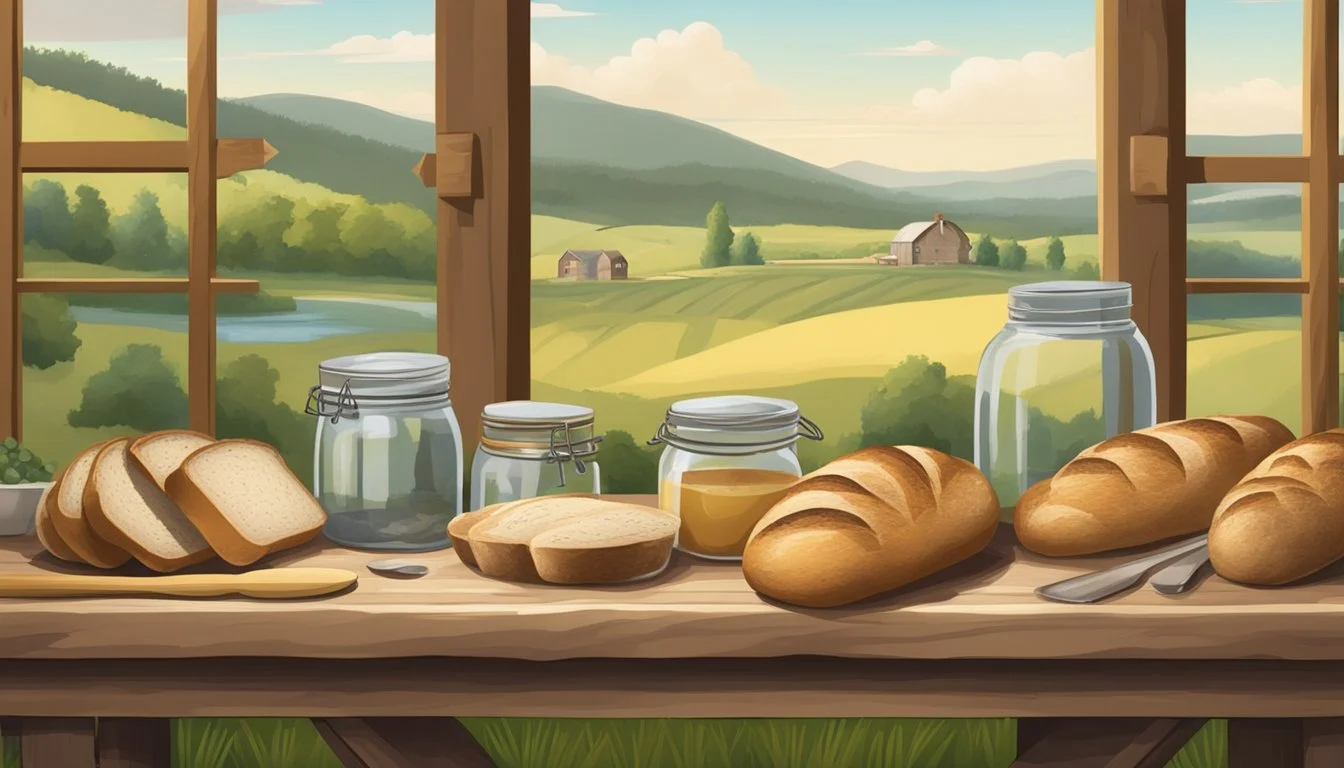Sourdough Baking Retreats
Explore the Art of Bread Making on Vacation
Sourdough baking has transcended being a mere hobby to become a sophisticated craft passionately pursued by aficionados. The intricate balance of flour, water, salt, and wild yeast captures the allure of ancient baking methods, continually drawing enthusiasts eager to refine their skills. In the intersection of this passion for bread (What wine goes well with bread?)-making and wanderlust, sourdough baking retreats have emerged as a unique vacation trend. These retreats offer a dual delight—the serenity that comes from travel and the enriching experience of learning.
Across various locales, from the sweeping landscapes of Brush Creek Ranch to the inviting backdrop of Waco, Texas, such retreats provide immersive experiences in bread crafting. Participants join professional bakers and fellow enthusiasts over several days, delving deep into the art of sourdough baking. These retreats are structured to cater to different skill levels, ensuring that every attendee can cultivate their craft, whether they are mastering the foundational techniques or exploring advanced nuances.
The hands-on sessions at these retreats often include a thorough exploration of sourdough, from maintaining a vibrant starter to mastering the perfect crust and crumb. In addition to the practical baking skills, guests often find these retreats to be rejuvenating, offering a chance to disconnect from the everyday rush and reconnect with a more rhythmic, tactile way of life. Sourdough baking retreats promise an educational journey wrapped in the comforts of travel, meeting the growing desire for experiences that are both insightful and restorative.
Essentials of Sourdough Baking
Sourdough baking marries the artistry of traditional methods with the science of fermentation, requiring both precision and intuition. Delving into the essentials equips enthusiasts with the foundation to create a variety of sourdough-based goods.
Understanding Sourdough Starter
A sourdough starter is a mixture of flour and water inhabited by wild yeast and bacteria. These microorganisms facilitate the fermentation process, which is critical for rise and flavor. Regular feedings of water and flour keep the starter active and robust.
Key Ingredients for Sourdough Bread
The quintessential ingredients for sourdough are simple: flour, water, and salt. The variable often overlooked is the starter. The choice of flour—whether whole grain or white—impacts the bread's structure and taste, while salt regulates yeast activity.
The Science of Sourdough Fermentation
During fermentation, wild yeast and bacteria metabolize sugars in the flour, producing carbon dioxide and organic acids. This not only causes the dough to rise but also contributes to flavor and gluten development, essential for texture.
Shaping and Techniques
Shaping sourdough involves a series of folds and techniques to build tension in the dough, creating a desirable shape and crumb structure. Key techniques include stretching and folding for strength and shaping for form.
Baking the Perfect Crust
Achieving the perfect crust entails controlling temperature and steam. Baking with a Dutch oven can mimic a professional oven's environment, trapping steam and ensuring a crisp, golden exterior.
From Mixing to Proofing
Mixing combines the elements, developing gluten and ensuring even distribution of the starter. Proofing allows the shaped dough to rise one final time before baking; this stage is crucial for flavor and texture.
Troubleshooting Common Sourdough Issues
Common issues range from a dense crumb to a lackluster rise. Adjusting hydration levels, proofing times, or starter vitality can resolve many problems. Observing dough behavior is key to troubleshooting.
Advanced Sourdough Baking Techniques
For the adventurous baker, experimental techniques such as altering hydration percentages or incorporating unique flours can yield artisan results. Mastery of temperature and timing can elevate bread quality significantly.
Sourdough Recipes Beyond Bread
Sourdough's versatility extends beyond bread to a range of pastries, from croissants to pizza bases. Each recipe utilizes the starter's leavening and flavoring properties.
Creating Your Sourdough Cookbook
Compiling recipes, notes, and personal reflections allows bakers to document their journey. A personal cookbook can reflect one's skill progression and serve as a guide for continued sourdough exploration.
Planning Your Sourdough Baking Retreat
Embarking on a sourdough baking retreat requires careful consideration of location, learning outcomes, and networking opportunities. From selecting a retreat that aligns with your baking aspirations to understanding the schedule of events, every detail enhances the overall experience.
Selecting the Right Baking Retreat
When choosing a retreat, it's imperative to look for programs led by experienced bakers or an executive pastry chef who can provide advanced techniques and in-depth knowledge. Opt for retreats that limit the number of participants to foster a more personalized learning environment for both novice and seasoned home bakers.
Itinerary Insights for Baking Enthusiasts
A thoughtfully crafted itinerary is the backbone of a successful baking retreat. Search for retreats that offer a diverse schedule including interactive workshops, starter maintenance sessions, and opportunities to practice different types of sourdough breads. Confirm that meals and breaks are structured into the day to keep energy levels high.
What to Expect at a Sourdough Baking Retreat
Anticipate a balance of structured baking sessions and free time for practice and relaxation. Participants typically receive a starter kit, with key ingredients being covered in the course fee. A welcome reception might be on the agenda, offering the chance to mingle with both peers and instructors.
Travel Preparation and Packing Tips
For travel to the retreat, pack essentials such as comfortable attire, notepads, and digital devices for note-taking. Consider carrying aprons or baking gloves if not provided. Keep space in your luggage for sourdough starters or baked goods you may want to bring home.
Social Opportunities and Networking
Small group settings are ideal for fostering relationships with likeminded individuals. Networking can be invaluable, so engage in scheduled social events and spontaneous gatherings to share experiences and insights about the craft of sourdough baking.
By focusing on these critical aspects, you can ensure a fulfilling and educational experience at your sourdough baking retreat.
Experiencing Sourdough Around the World
Traveling the globe reveals the rich tapestry of sourdough bread-making traditions, offering unique learning experiences and a taste of history.
Sourdough Bread-Making in France
French bakers are renowned for their sourdough baguettes and brioche, which stand as testaments to traditional techniques refined over centuries. The distinct crumb and flavor of French sourdough is a result of the meticulous selection of different flours and bread flour, as well as long fermentation processes.
Italian Sourdough Specialties
Italy's artisan sourdough spans beyond its famous pizza, to include varieties like pane di Altamura, characterized by its artisan crust and flavorful crumb. Visitors often engage in sourdough baking retreats, where they learn the subtleties of Italian sourdough influenced by regional flour types and methods.
Sourdough Variations Across Cultures
Every culture has its interpretation of sourdough, with each region’s bread offering a different flavor profile and history. From the dense rye loaves of Germany to the tangy injera of Ethiopia, sourdough's versatility is celebrated worldwide.
The History and Tradition of Sourdough Baking
The history of sourdough is as old as civilization itself, spanning back to ancient Egypt. Sourdough baking is steeped in tradition, and its resilience is a testament to its enduring appeal and adaptability in various cultures.
Exploring Artisan Baking Retreats in Tuscany
Tuscany is home to an array of artisan bread-making courses, where the love for sourdough is coupled with the region's famous wine. These retreats not only teach the art of sourdough baking but also offer a holistic travel and cultural experience through a lens of culinary excellence.
Customizing Your Baking Experience
Baking retreats provide an excellent opportunity to tailor learning, allowing both beginners and seasoned bakers to perfect the art of sourdough and bread-making. They offer a range of sessions where individuals can gather insights into the nuanced techniques that elevate homemade bread.
Workshops for Novices and Professionals
Retreats often host workshops designed to suit every skill level. Novices can start with the basics of sourdough, including starter creation and maintenance, while experienced bakers can delve into the intricacies of fermentation or learn novel shaping techniques. This ensures that every participant has access to knowledge that matches and extends their abilities.
Private vs. Group Baking Sessions
Participants can choose from private or group sessions depending on their learning preference. Private sessions provide tailored guidance, focusing on specific questions or challenges an individual might have. Conversely, group sessions promote an interactive learning environment where bakers of various levels can share experiences and techniques in small, collaborative groups.
Baking at Home: Applying the Learned Skills
Transitioning from the retreat environment to home baking is crucial. Participants learn adaptable skills and secrets to recreate professional-level sourdough in a home kitchen setting. Workshops emphasize technique modifications that consider the differences in equipment, ingredients, and environment between the retreat and home.
Continuing Education and Advanced Courses
For those looking to further refine their skills, many retreats offer advanced courses. These sessions focus on complex techniques and theories behind bread-making, ideal for the home bakers and professionals aspiring to master sourdough and innovate within their craft. Advanced courses often cover the latest trends in artisan baking and the ever-evolving world of sourdough.
By offering a customizable baking experience, retreats empower individuals to integrate the joy of sourdough and bread-making into their daily lives, whether they seek to impress family and friends or aim to champion the next wave of artisanal baking excellence.
Conclusion
Sourdough baking retreats offer a specialized experience where enthusiasts can enhance their skills in a focused and immersive setting. These retreats, often set in picturesque locations, merge the joy of travel with the satisfaction of learning. Participants can benefit from expert-led workshops, hands-on practice, and the exchange of ideas among peers.
Benefits of Attending a Sourdough Baking Retreat
Hands-on Learning: Direct guidance from professional bakers enhances one's technique and understanding of sourdough.
Culinary Adventure: New recipes and innovative twists on classic techniques expand a baker's repertoire.
Networking: Opportunities to meet like-minded individuals and form connections within the baking community.
Upcoming Opportunities in Spring 2024
As of spring 2024, numerous retreats are inviting bakers to refine their craft:
The Farm at Brush Creek: Offers a robust itinerary that includes advanced baking techniques.
Waco Retreat: A community-centered event that aims to rejuvenate the participants' passion for baking.
The Sourdough School (UK): Connects healthcare professionals with culinary insights, combining wellness with the art of sourdough baking.
Traveling with a Starter: Guidance provided for maintaining your sourdough culture while on the move.
The trend of combining travel with learning through baking retreats exemplifies creativity and the pursuit of mastery in the culinary arts. They promise an enriching experience that goes beyond the oven and into the heart of diverse cultures and communities, with sourdough as the centerpiece of this edible journey.






